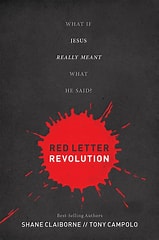Following is an excerpt about Red Letter Revolution written by Shane Claiborne and Tony Campolo
The movement toward a purer, more bare-bones Christianity, one that looks more like Jesus, has been happening periodically since early church history, when Constantine first took control of the church and moved it far away from its roots, and Christians reacted in counterforce to bring it back. Every age has had its Christian reformers, working both inside and outside the church to promote the biblical values of life, liberty, and love. Red Letter Revolution tips its hat to this long tradition of holy agitation.
Why single out the red letters? some people ask. If you believe that all of Scripture is divinely inspired, then why elevate the red letters over the black letters?
Tony and Shane unequivocally affirm the God-breathed authority of the sixty-six-book canon. But they believe that the revelation given to us in Jesus is something unique. The incarnation of Christ was the climax of history, they say, and the ultimate fulfillment of Jewish law—all of Scripture points toward him. And his words, recorded in the four Gospels, provide the lens through which Christians are to look at the world. If we want to know the heart of God, we can discern it in the words of Jesus, because Jesus is God, with skin on; we can’t do the same with the other biblical speakers, at least not as straightforwardly.
Tony writes,
From churches and theologians, I get conflicting images of God. It’s only when I view Jesus in the red letters of the Bible that I am able to say, “Ah, here’s a clear image of God. God is like Jesus! Jesus is God!” What I know about God is what I find in Jesus, and anything that deviates from the revelation of God found in Jesus’ words is not part of what I believe to be the true image of God. I am constantly comparing the images of God that have been conjured up in my own imagination with what I find in the Bible. I regularly go back to the Jesus I find in Scripture, and time and time again I ask myself, In what way does my thinking about God conform to what I find in Jesus?
As Paul writes in Colossians 2:9, “In Jesus the fullness of God is revealed.”
Christianity isn’t about doing what’s sensible but about doing what’s called for. This is one of the toughest truths I’ve grappled with since first reading Shane Claiborne in college and having my eyes opened to how hard a lot of the teachings of Jesus really are, how against our natural impulses and even our sense of logic sometimes. Here’s a handful of examples, all of which come from Jesus’s Sermon on the Mount:
-
- Matthew 5:39: “Do not resist an evil person. If someone strikes you on the right cheek, turn to him the other also.” (Ever thrown a punch or hurled an insult?)
- Matthew 5:40: “If someone wants to sue you and take your tunic, let him have your cloak as well.” (Ever been involved in a civil lawsuit?)
- Matthew 5:42: “Give to the one who asks you, and do not turn away from the one who wants to borrow from you.” (Ever ignored or refused a homeless person’s request for spare change? Or even a sibling who wants to borrow your car or your dress for the night?)
- Matthew 5:44: “Love your enemies.” (That probably means we shouldn’t kill them, right? Ever supported your country going to war?)
- Matthew 6:19: “Do not store up for yourselves treasures on earth.” (Do you have a savings account? Do you live in even the slightest excess?)
There are logical objections to all of these verses—“but I want to protect myself!”, “I don’t want people to just walk all over me!”, “I want to provide for my family!”, “how do I know he won’t use my money to buy drugs?”, “it’s my right!”—but again, Jesus doesn’t ask us to act logically, but faithfully. He calls us to live an alternative lifestyle that, to the world, looks ridiculous. It’s a divine ethic, and if it offends our sense of right, our sense of justice, it’s probably because that sense of ours is not shaped by grace as it should be.
The challenge here is: Be more reckless. In the name of Christ, who recklessly gave of himself, and is still giving.
Jesus repeatedly challenged people’s notions of who’s in and who’s out in God’s family and seemed to emphasize orthopraxy (right practice) over orthodoxy (right belief).
Some evangelicals are obsessed with declaring who is going to heaven and who is not, based on the rigid theologies they have developed. But a creed alone does not a Christian make. In Jesus’s parable of the sheep and the goats (Matthew 25:31-46), the ones who enter into eternal life are not those who have said yes to a list of doctrines, but those who fed the hungry, clothed the naked, visited prisoners, and cared for the sick.

